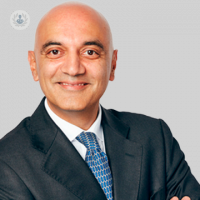Vaginal prolapse: what you should know before considering surgery
Escrito por:This information has been produced to help you decide whether surgery is the right treatment for vaginal prolapse. Mr Arvind Vashisht, a highly-respected gynaecologist based in London, has put together this information to ensure you are fully informed of the risks, complications, benefits and alternative treatments available before deciding to jump ahead with the surgery.

What type of surgery should I choose?
There are several operations for prolapse. Your choice of surgery will depend on the type of prolapse you have, but there are other important factors.
A desire for future pregnancy is one such consideration. Your surgeon might also recommend a particular operation for medical reasons. Of course, not proceeding with surgery is also a reasonable option and you could consider conservative choices if you wish.
Surgery for prolapse should be regarded as a major procedure. Most commonly, it is performed to treat the primary symptoms of a lump coming down in the vagina, or helping correct where the walls of the vagina have weakened. It may also lead to secondary improvements in bowel and bladder symptoms, but this is not always the case, and indeed these symptoms may occasionally worsen.
Surgery can be done vaginally or abdominally (usually by keyhole surgery), and there are various indications, benefits and risks of either approach. Depending on the extent of your prolapse the surgeon may discuss the need to treat prolapse of the womb.
What are the alternatives to surgery?
Before you consider surgery, you should think about other options:
- Carrying on as you are
- Pelvic floor physiotherapy
- The use of a vaginal pessary
If you decide not to have treatment, you will continue to be troubled by your symptoms. However, you are very unlikely to come to any harm.
Physiotherapy is an effective treatment, especially if your prolapse is not too severe. Around half of women who engage in physiotherapy will find that their symptoms improve. Physiotherapy appears to continue working provided that you do not stop practising your exercises. If your prolapse is quite severe, we are not sure how well physiotherapy works.
Vaginal pessaries are an alternative treatment. A pessary is a removable device that is placed in your vagina. Most are made of soft plastic or silicone and shaped like a ring. There are different types of pessary and they come in different sizes. Pessaries relieve prolapse symptoms by keeping the womb and vaginal walls in their normal position. A number of women might experience some bleeding or discharge when they use a pessary. Rarely, a minor infection might develop, but these problems are usually easy to treat.
What are the complications of surgery?
All operations can be associated with complications. If a complication affects you, it does not mean that something must have gone wrong during the surgery. Although the risk of most complications is low, we recommend that patients try non-surgical treatments before surgery as they are generally not associated with serious complications. Complications that can be associated with surgery include:
- Bleeding and blood transfusion
- Infections
- Blood clots in the legs travelling to the lungs
- Damage to the bowel, bladder, and other organs
- New or worsening bowel or bladder symptoms
- Painful sexual intercourse
- Long-term problems with pain
- Problems with implanted mesh used to repair prolapse
- Failure of the operation to cure the prolapse
Unfortunately, there is a high rate of failure of some prolapse operations and if the operation fails it is because prolapse is a result of weak tissue coupled with lifestyle factors. This is why different techniques have been developed to try and lessen the recurrence rates of prolapse and why taking care before and after surgery is important.
Will I need more than one operation?
Sometimes prolapse might only affect one area, such as the womb or the vaginal walls. More commonly, these problems affect more than one area at a time. For this reason, your surgeon might need to perform more than one surgical procedure to help you. Your surgeon will explain which types of surgery they think are needed.
Can I have surgery if I want more children?
It is generally recommended that you avoid surgery if you are planning to have more children. Further pregnancy or vaginal delivery might reduce the long-term success of your operation.
However, if your symptoms are difficult to control with non-surgical treatments your surgeon can discuss other options.
If you have prolapse of the womb, the womb can be lifted using stitches or sometimes mesh inserted using keyhole surgery. Pregnancy is possible after this procedure, although the success of the operation might be affected. If you have vaginal wall prolapse, a vaginal operation to repair the prolapse using stitches is an option. It would be usually recommended to have a caesarean section to deliver your baby in a future pregnancy. Sometimes, just getting pregnant again can affect your repair, even if you do not deliver vaginally. For this reason, it is best to avoid surgery and try other treatments until your family is complete.
Visit Mr Arvind Vashisht’s profile where you can book a consultation with him.


